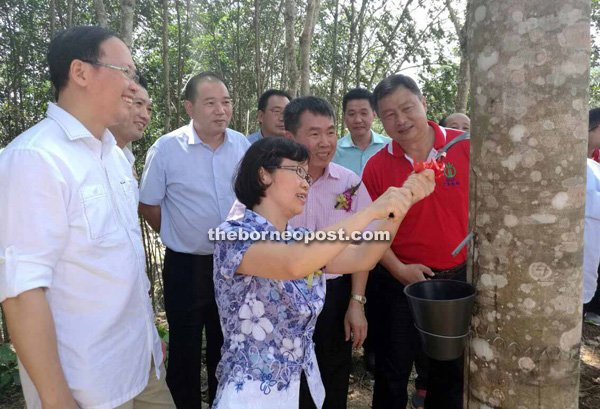
Chen trying to tap rubber while Teo (left) and others look on.
SOOK: The joint venture (JV) between Bornion Timber Sdn Bhd and Guangdong Guangken Rubber Group Co Ltd of China in rubber forest plantation in Forest Management Unit (FMU11) here has finally come into fruition as the rubber trees are now ready to tap.
Minister of Special Tasks Datuk Teo Chee Kang officiated at the rubber tapping ceremony of Bornion Guangken Rubber Sdn Bhd (BGR), a JV company formed by Bornion Timber and Guangdong Guangken Rubber Group yesterday.
Teo said BGR had planted more than four million rubber trees over 15,000 hectares since the company’s ground breaking and rubber tree planting ceremony which was officiated by Chief Minister Datuk Seri Musa Haji Aman in 2009.
He said BGR was the largest JV project in Sabah whereby USD80 million investment fund had been channeled from China to the State for the rubber forest plantation.
“Datuk Wee Kok Tiong, the managing director of Bornion Timber, has set a target to plant six million rubber trees or more.
“This is a major achievement, especially to the people in Sook, because this is the largest rubber estate in Malaysia,” Teo said when officiating at the event at Bornion Timber Base Camp at Ulu Milan Forest Reserve here.
BGR is undertaking about 30,000 hectares of rubber forest plantation in FMU11.
The idea to jointly develop the rubber forest plantation between Bornion Timber and Guangdong Guangken Rubber Group began in 2006.
On September 13, 2008, Musa witnessed the signing ceremony of the JV agreement between both companies, after which BGR was officially formed. Musa subsequently officiated at the ground breaking ceremony of BGR on July 6, 2009.
At present, Teo said BGR had recruited more than 1,000 employees to work on the rubber plantation, of which over 90 per cent of them were locals.
“I am confident that as BGR begins to tap the rubber trees, the company will need more rubber tappers and workers to process (the latex) in the factory.
“Perhaps in the future we will need 5,000 workers, who can be recruited from Sook, Nabawan and Keningau,” he said.
Teo added that BGR was also committed in its corporate social responsibility (CSR) programme by allowing Universiti Malaysia Sabah (UMS) students, especially those studying agriculture and forestry, to stay for a month at the base camp to gain practical experience.
He said Bornion Timber was one of the FMU firms which has shown and was awarded for its outstanding performance in forest management.
Teo also lauded Wee as a visionary man for the latter had turned tree roots, which most see as worthless items, into invaluable wood sculptures that were exhibited at the event yesterday.
He said Wee had shipped the tree roots to be carved in China and insisted on bringing the sculptures back to Sabah despite being offered high price for the artwork.
“The tree roots are worthless but after they have been carved into sculptures, they become priceless art masterpieces.
“This carries an important message. Sabah is blessed with rich natural resources, vast areas of fertile land, mountains, sea, rivers, beautiful islands, oil and gas.
“We know we have these resources, but do we realize we can maximize their potential in Sabah?”
Teo said Sabahans should know how to maximize the potential of our resources so that Sabah could become a progressive state where the people enjoy a higher standard of living.
On the other hand, Teo said diplomatic relations between Malaysia and China has been established since 1974.
Malaysia and China have the closest ties in the Southeast Asia region as well as have frequent exchanges at both the governmental and people-to-people levels.
“Under the Belt and Road initiative advocated by Chinese President Xi Jinping, we hope to see more collaborations between Malaysian and China companies.
“I and Chen Peijie (Consul General of the People’s Republic of China in Kota Kinabalu), look forward to seeing more China-based companies collaborate with local enterprises in Sabah in order to create a win-win situation for all.”
Meanwhile, Chen said the JV between Bornion Timber and Guangdong Guangken Rubber Group was an exemplar of a successful and mutually beneficial partnership as both companies complement each other in agricultural technology, financial resources, management and resource allocation.
In recent years, Chen said Sabah has been encouraging China and other foreign investors to develop the tourism, agriculture, oil and gas industries in the State.
“We hope to see more China companies in Sabah. And we look forward to more collaborations between both countries.”
On the other hand, Wee said the Sabah State Government approved Bornion Timber a 100-year sustainable forest management licence for 100,000 hectares of FMU. In 2005, Bornion Timber began planting rubber trees at the FMU.
In 2006, Wee said the Consulate General of the People’s Republic of China in Kuching facilitated a meeting between Bornion Timber and Guangdong Guangken Rubber Group, which resulted in the signing of a 50-year JV agreement witnessed by Musa in the same year.
Guangdong Agribusiness Group Corporation chairman Lei Yong Jian added that Bornion Timber and Guangdong Guangken Rubber Group signed another agreement in March this year to expand the rubber forest plantation to 200,000 acres.
“After seven years, the partnership between Bornion Timber and Guangdong Guangken Rubber Group has grown stronger and closer,” he said.
Also present at the event was Assistant Minister to the Chief Minister, Datuk Ellron Angin.
